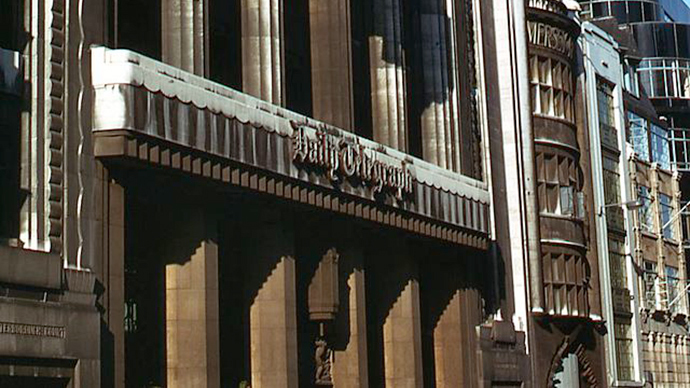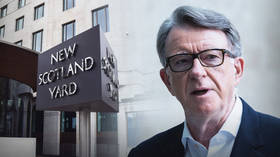‘Democracy itself in peril’: Telegraph commentator quits over paper’s HSBC links

Peter Oborne, journalist and respected political commentator for the Telegraph, has published a lengthy resignation letter in which he condemns the links between the newspaper and scandal ridden banking giant HSBC.
His letter, published online, documents years of editorial decisions marred by the paper’s advertising contracts with the bank, including the decision not to follow the recent HSBC tax-avoidance scandal as closely as other media outlets, and even removing some articles from the site completely.
“The coverage of HSBC in Britain's Telegraph is a fraud on its readers. If major newspapers allow corporations to influence their content for fear of losing advertising revenue, democracy itself is in peril,” the letter reads.
He said the pressure put on the paper to maintain advertising from HSBC was a “sinister development,” which blurred the traditional boundary between advertising and editorial sectors, with HSBC described as the "advertiseryou literally cannot afford to offend.”
Their coverage of the HSBC scandal, in which it was revealed the bank had been aiding clients in avoiding vast tax bills, was mirrored by earlier coverage of the Hong Kong protests during 2014.
“A free press is essential to a healthy democracy,” he writes, adding “there is a purpose to journalism, and it is not just to entertain. It is not to pander to political power, big corporations and rich men.”
READ MORE:'Sincerest apologies': HSBC CEO begins damage control after tax evasion leak
“Newspapers have what amounts in the end to a constitutional duty to tell their readers the truth.”
He said the embargo on publishing articles criticizing HSBC had begun in 2013, after the bank suspended its advertising contract with the Telegraph following investigations into its offshore accounts in Jersey.
It took the paper a year to regain the advertising contract, Oborne recalls, but the pressure on the editorial sector became intolerable and he resigned in December. He says he fully intended to “leave quietly,” but after the paper’s “microscopic” coverage of the HSBC tax scandal, he felt a duty to speak out.
If Peter Oborne's right, and no doubt he is, then the hold that corporations have over politics through lobbying must be staggering
— Antoine Blampied (@AntonyBlampied) February 18, 2015
“If advertising priorities are allowed to determine editorial judgments, how can readers continue to feel this trust? The Telegraph’s recent coverage of HSBC amounts to a form of fraud on its readers. It has been placing what it perceives to be the interests of a major international bank above its duty to bring the news to Telegraph readers.”
The article, which the Telegraph quietly removed from its website, alleged HSBC had a £70-billion hole in its finances. They took the article down despite the analysis coming from an independent company and being covered by many other news outlets.
A contemporary of Oborne, Alex Massie, says he “performed a great public service” by writing the letter, calling Oborne a man “of great conviction.”
Sad to see Peter Oborne leave the Daily Telegraph. An iconoclastic voice and a man of integrity.
— John McTernan (@johnmcternan) February 18, 2015
Massie wrote in the Spectator, which itself shares a proprietor with the Telegraph, that if the reputation of the Telegraph had been damaged by the revelations, then the reputation of HSBC is, once again, on the line.
“The bank is, as I say, free to spend its marketing budget as it sees fit but the idea it can think it reasonable to bully and threaten newspapers if they dare to run ‘unhelpful’ stories is another example of an over mighty corporation that evidently thinks the world deserves to be arranged in ways that comfort HSBC.”












